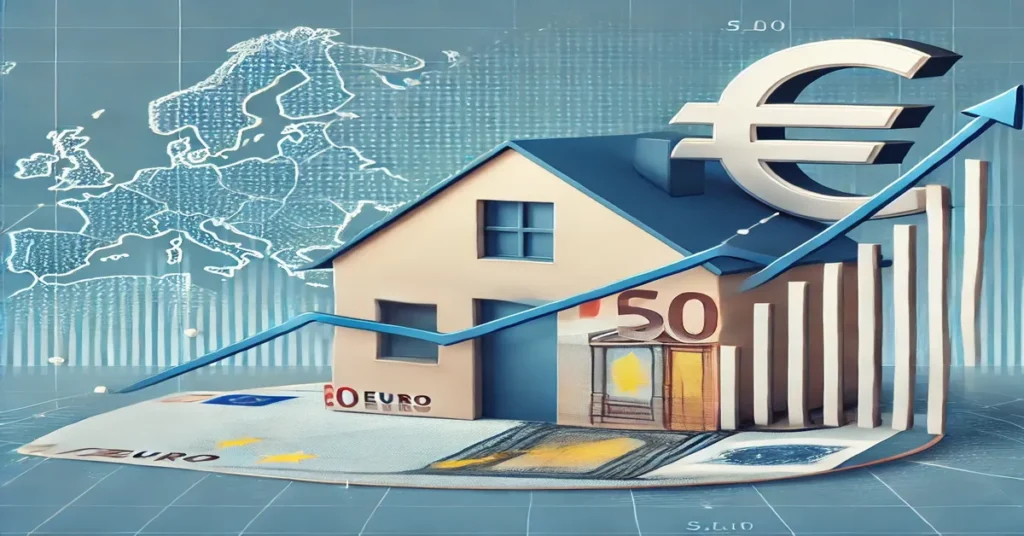The https://finanzasdomesticas.com/euribor-sube/ (Euro Interbank Offered Rate) is one of the most influential benchmarks in the European financial landscape. Used primarily to calculate interest rates on variable-rate mortgages, loans, and other financial products, Euribor directly affects millions of households and businesses across the Eurozone. When Euribor rises, its impact reverberates widely, creating ripples across economic activities, financial markets, and personal finances.
This article explores the concept of Euribor, its recent upward trends, the factors influencing its rise, and the implications for borrowers, investors, and the broader economy.
What is Euribor?
Euribor is a daily reference rate, reflecting the average interest rate at which a selection of European banks lend unsecured funds to one another in euros. It is calculated by the European Money Markets Institute (EMMI) based on submissions from a panel of banks. Euribor serves as a benchmark for various financial products, including:
- Variable-rate mortgages
- Business loans
- Consumer loans
- Derivatives
The Role of Euribor in Financial Markets
Euribor plays a pivotal role in the functioning of the financial system:
- Mortgage Payments: Variable-rate mortgages are directly tied to Euribor. When Euribor rises, so do the monthly payments for borrowers.
- Loan Pricing: Many loans, including corporate and personal loans, use Euribor as the base rate, impacting the cost of borrowing.
- Economic Indicators: Euribor is a barometer of financial market conditions and interbank liquidity.
Understanding the Recent Rise in Euribor
In recent years, Euribor has transitioned from historically low and even negative levels to a pronounced upward trajectory. This trend has sparked concerns among homeowners, businesses, and policymakers alike.
Historical Context of Euribor
From 2015 to 2021, Euribor remained at historically low levels, driven by the European Central Bank’s (ECB) ultra-loose monetary policies. During this period, negative interest rates and quantitative easing measures were implemented to counteract the effects of the Eurozone debt crisis and sluggish economic growth.
By 2022, inflationary pressures, exacerbated by global supply chain disruptions and the energy crisis following geopolitical conflicts, prompted the ECB to shift its stance. The central bank began raising interest rates to tame inflation, leading to an increase in Euribor.
Recent Trends
As of 2024, Euribor has reached levels unseen in over a decade. The three-month Euribor, one of the most widely used benchmarks for mortgages, has risen significantly. For example:
- In August 2024, Euribor experienced its largest monthly drop in over a decade but remained at historically elevated levels.
- Projections suggest that the rate may stabilize or gradually decrease by 2025, contingent on the ECB’s monetary policy decisions and economic recovery.
Factors Driving Euribor’s Rise
Several key factors have contributed to the upward trend in Euribor:
1. ECB Monetary Policy
The primary driver of Euribor’s increase is the ECB’s decision to raise its key interest rates to combat inflation. By making borrowing more expensive, the central bank aims to curb excessive demand and bring inflation back to its target of 2%.
2. Inflationary Pressures
High inflation rates, fueled by rising energy prices, wage growth, and supply chain challenges, have forced central banks to tighten monetary policy. Euribor reflects these tighter financial conditions.
3. Interbank Market Dynamics
Euribor rates are influenced by the liquidity conditions in the interbank market. Reduced liquidity, due to cautious lending practices among banks, can push Euribor higher.
4. Global Economic Trends
Global events such as geopolitical tensions, economic slowdowns in major economies, and changes in U.S. Federal Reserve policy indirectly impact Euribor by shaping market expectations.
Impact of Euribor’s Rise on Borrowers
1. Homeowners with Variable-Rate Mortgages
The most immediate impact of a rising Euribor is felt by homeowners with variable-rate mortgages. These loans are often structured as Euribor plus a fixed margin. For instance:
- A homeowner with a €200,000 mortgage and a rate of Euribor + 1% will see their monthly payments increase as Euribor rises.
- If Euribor rises from 1% to 3%, the annual cost of the mortgage could increase by several thousand euros.
This has led to financial strain for many households, particularly those already struggling with the rising cost of living.
2. Business Loans
Companies relying on variable-rate loans face higher borrowing costs, which can affect their profitability and investment plans. Small and medium-sized enterprises (SMEs), in particular, may struggle to absorb these additional costs https://finanzasdomesticas.com/euribor-sube/.
3. Consumer Loans
Personal loans and credit lines tied to Euribor have also become more expensive, reducing disposable income for consumers and potentially curbing spending.
Impact on the Broader Economy
1. Economic Growth
Higher interest rates, reflected in a rising Euribor, can dampen economic growth by reducing borrowing and investment. This is a deliberate trade-off as central banks prioritize controlling inflation over short-term growth.
2. Housing Market
Rising mortgage rates have led to a slowdown in the housing market. Prospective buyers are deterred by higher financing costs, leading to reduced demand and, in some cases, declining property prices.
3. Inflation
While a rising Euribor is intended to counteract inflation, it can also lead to short-term price pressures as businesses pass on higher financing costs to consumers.
Strategies for Managing the Impact of Rising Euribor
Borrowers and investors can take proactive steps to mitigate the effects of a rising https://finanzasdomesticas.com/euribor-sube/.
1. Fixed-Rate Mortgages
Switching from a variable-rate to a fixed-rate mortgage can provide stability and protect against future rate hikes.
2. Loan Restructuring
Refinancing or negotiating loan terms with lenders can help reduce monthly payments.
3. Budget Adjustments
Households and businesses should review their budgets and prioritize debt repayment to minimize the financial burden https://finanzasdomesticas.com/euribor-sube/.
4. Financial Advice
Seeking professional financial advice can help individuals and businesses navigate the complexities of rising interest rates and identify tailored solutions.
Future Outlook
Economists anticipate that Euribor may stabilize or decline modestly by 2025, as inflation pressures subside and the ECB adjusts its policy stance. However, uncertainties remain, including the trajectory of global economic growth and the impact of ongoing geopolitical tensions.
Conclusion
The rise in https://finanzasdomesticas.com/euribor-sube/ has far-reaching implications for borrowers, lenders, and the economy as a whole. Understanding the factors driving this trend and its impact on financial products is crucial for making informed decisions. While the current environment presents challenges, it also offers opportunities for individuals and businesses to reassess their financial strategies and adapt to changing conditions.
FAQs
1. What is Euribor, and why does it matter?
Euribor is the average interest rate at which European banks lend to one another in euros. It serves as a benchmark for various financial products, including mortgages and loans, making it a key indicator of financial market conditions.
2. How does a rising Euribor affect my mortgage?
If you have a variable-rate mortgage tied to Euribor, an increase in Euribor will lead to higher monthly payments. Fixed-rate mortgages are not directly affected by changes in Euribor.
3. Why is Euribor rising?
Euribor is rising primarily due to the European Central Bank’s efforts to combat inflation by raising interest rates. Other factors include interbank market dynamics and global economic conditions.
4. Can I protect myself from rising Euribor rates?
Yes, you can switch to a fixed-rate mortgage, refinance your loan, or adjust your budget to manage higher costs. Consulting a financial advisor can also help identify the best strategy.
5. What are the implications of a rising Euribor for businesses?
Businesses face higher borrowing costs, which can impact their profitability and investment plans. Small and medium-sized enterprises are particularly vulnerable.
6. Will Euribor continue to rise?
While Euribor is currently high, projections suggest it may stabilize or decline by 2025, depending on inflation trends and ECB policy decisions.







